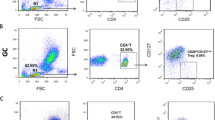Abstract
Objectives Regulatory T cells play an active role in the maintenance of the immune system’s tolerance of both foreign and self antigens. Particularly, CD4 + CD25 + regulatory T cells participate in tumor immunity. The study provided further evidence on the involvement of CD4 + CD25 + regulatory T cells in immune system impairment in patients with gastrointestinal malignancies. Methods Using flow cytometry, CD4 + CD25 + regulatory T cells were analyzed in peripheral blood from 114 patients with gastrointestinal malignancies and 15 healthy controls. Results The prevalence of the CD25 + subset in CD4 + T cells was increased in patients with colorectal carcinoma compared with healthy controls. The phenotic characteristics of the CD4 + CD25 + T cells in patient with malignancies were low expression of CD45 RA and no expression of CD69. Our results indicated that when compared with healthy control, the proportions of CD4 + CD25 + T cells in the peripheral blood of patients with colorectal, gastric, and esophageal carcinoma were significantly higher (P < 0.05) in colorectal carcinoma (22.11 ± 9.65%), gastric carcinoma (17.74 ± 4.24%), and esophageal carcinoma (24.37 ± 4.82)%, respectively. Further analysis on the proportion of CD4 + CD25 + T cells revealed that those patients with gastrointestinal malignancies in stages IV were higher than those of in stage I–III, though no significant difference was observed (P > 0.05). However, the proportion of CD4 + CD25 + T cells in the patients with relapse gastric carcinoma (23.32 ± 4.98%) was significantly higher than that of patients with primary gastric carcinoma (P < 0.01). Conclusions The increased CD4 + CD25 + T cells in patients with gastrointestinal malignancies may be related to immunosuppression and tumor progression. This suggests that elimination or reduction of CD4 + CD25 + regulatory T cells can improve effective tumor immunity for immunotherapy.

Similar content being viewed by others
References
Shevach EM. Certified professionals: CD4 +CD25 + suppressor T cells. J Exp Med. 2001;193:41–6. doi:10.1084/jem.193.11.F41.
Liu L, Yao JX, Ding Q, Huang SA. CD4 +CD25 + regulatory T cells in peripheral blood of patients with gastric and esophageal cancers. China J Mod Med. 2007;17:301–4. doi:10.1007/s11655-007-0301-8. Chinese.
Sakaguchi S, Sakaguchi N, Asano M, Itoh M, et al. Immunologic self-tolerance maintained by activated T cells expressing IL-2 receptor α-chains(CD25). Breakdown of a single mechanism of self-tolerance causes various autoimmune diseases. J Immunol. 1995;155:1151–64.
Jounleit H, Schmitt E, Stassen M, et al. Identification and functional characterization of human CD4+CD25+ T cells with regulatory properties isolated from peripheral blood. J Exp Med. 2001;193:1285–94. doi:10.1084/jem.193.11.1285.
Dieckmann D, Plottner H, Berchtold S, et al. Ex vivo isolation and characterization of CD4+CD25+ T cells with regulatory properties from human blood. J Exp Med. 2001;193:1303–10. doi:10.1084/jem.193.11.1303.
Onizuka S, Tawara I, Shimizu J, et al. Tumor rejection by in vivo administration of anti-CD25(interleukin-2 receptor alpha) monoclonal antibody. Cancer Res. 1999;59:3128–33.
Steitz J, Bruck J, Lenz J, et al. Depletion of CD4 +CD25 + T cells and treatment with tyrosinase-related protein 2-transduced dendritic cells enhance the interferon alpha-induced, CD8 + T-cell-dependent immune defense of B16 melanoma. Cancer Res. 2001;61:8643–6.
Baecher-Allan C, Brown JA, Freeman GJ, et al. CD4 +CD25 + regulatory cells in human peripheral blood. J Immunol. 2001;167:1245–53.
Sobin LH, Wittekind C. TNM classification of malignant tumors. 5th ed. New York: Wiley; 1997.
Wolf AM, Wolf D, Steurer M, et al. Increase of regulatory T cells in the peripheral blood of cancer patients. Clin Cancer Res. 2003;9:606–12.
Rosenberg SA. Progress in human tumor immunology and immunotherapy. Nature. 2001;411:380–4. doi:10.1038/35077246.
Tanaka H, Tanaka J, Kjaergard J, et al. Depletion of CD4+CD25+ regulatory T cells augments the generation of specific immune T cells in tumor-draining lymph nodes. J Immunother. 2002;25:207–17. doi:10.1097/00002371-200205000-00003.
Levings MK, Sangregorio R, Roncarolo MG. Human CD4+CD25+ T regulatory cells suppress naïve and memory T cell proliferation and can be expanded in vitro without loss of function. J Exp Med. 2001;193:1295–302. doi:10.1084/jem.193.11.1295.
Ey Woo, Chu CS, Goletz TJ, et al. Regulatory CD4 +CD25 + T cells in tumors from patients with early-stage non-small cell lung cancer and late-stage ovarian cancer. Cancer Res. 2001;61:4766–72.
Sasada T, Kimura M, Yoshida Y, et al. CD4 +CD25 + regulatory T cells in patients with gastrointestinal malignancies. Cancer. 2003;98(5):1089–99. doi:10.1002/cncr.11618.
Author information
Authors and Affiliations
Corresponding author
Rights and permissions
About this article
Cite this article
Shi, X., Liu, L. & Din, Q. A study on the CD4 + CD25 + regulatory T cells in patients with gastrointestinal malignancies. Med Oncol 26, 471–475 (2009). https://doi.org/10.1007/s12032-008-9151-2
Received:
Accepted:
Published:
Issue Date:
DOI: https://doi.org/10.1007/s12032-008-9151-2




